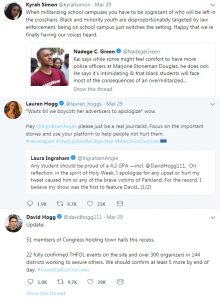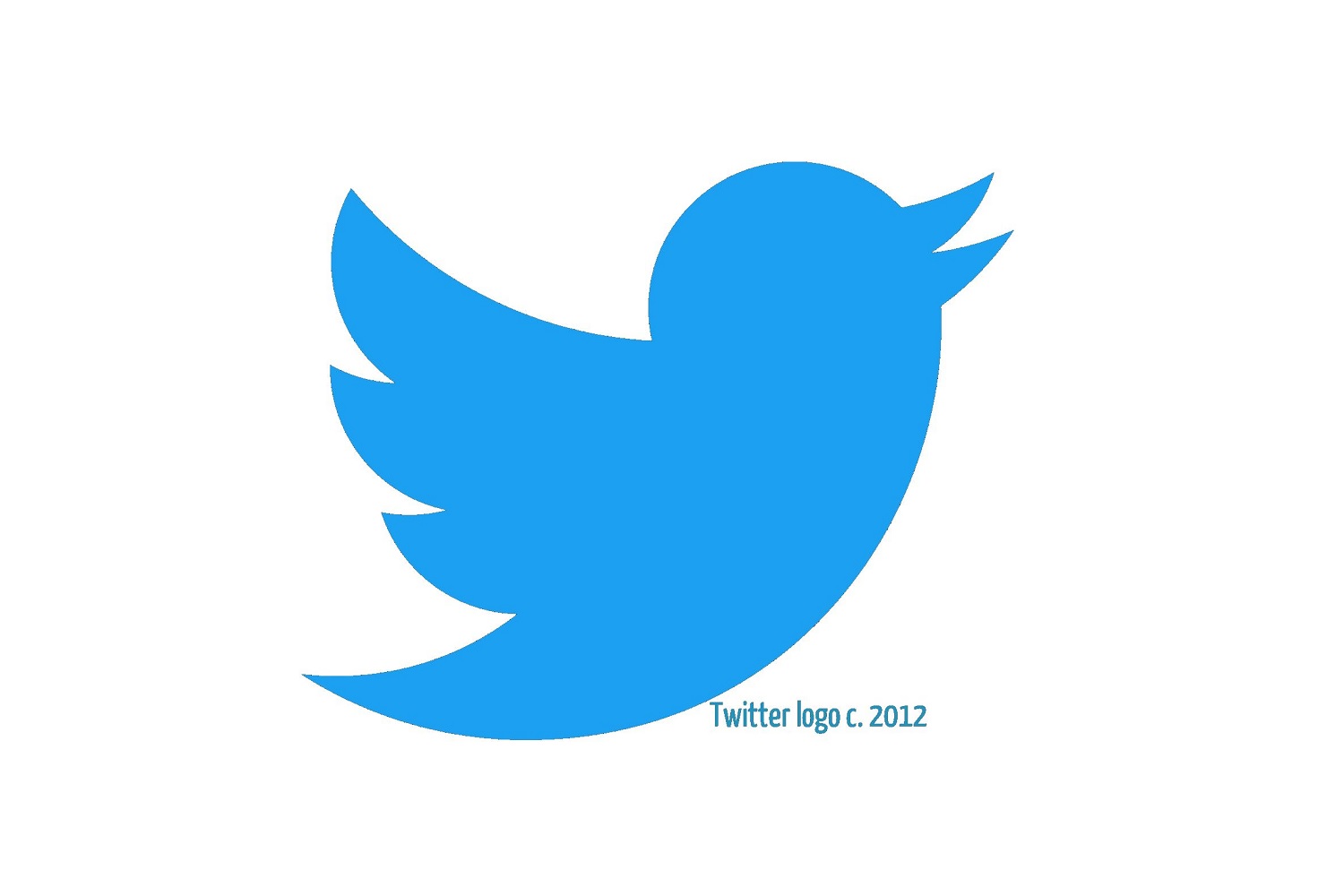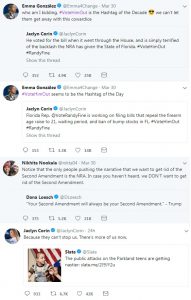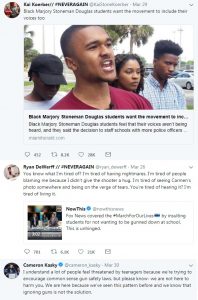Parkland and the Twittered Revolt
Marvel at the teen survivors of the mass shooting at Marjory Stoneham Douglas High School in Parkland, Florida. Their composed rage is terrifying to a generation or two which have not seen the like since the 1960s and early 1970s. They are leading a revolution — but note the platform they’re using to best effect.

I can’t tell you how much use they are making of Facebook as I haven’t used it in several years. What I find telling is the dearth of links to students’ and followers’ Facebook posts tweeted into my timeline. I also note at least one MSD student exited Facebook after receiving death threats.
Twitter’s platform allows the authenticity and immediacy of the students’ communications, as easy to use as texting. There’s no filter. For whatever reason, parents haven’t taken to Twitter as they did Facebook, leaving the micro-blogging platform a space without as much adult oversight.
These attributes terrify the right-wing. There’s nothing limiting the reach of students’ messages — no algorithms slow their tweets. The ability to communicate bluntly, efficiently, and yet with grace has further thrown the right. The right-wing’s inability to accept these students as legitimately speaking for themselves and for their fellow students across the country is an expression of the right’s cognitive dissonance.
The students’ use of Twitter redeems the platform, asserting its true value. It’s 180 degrees from the problems Twitter posed as a toxic cesspool filled with trolls and bots. Parkland’s tragedy exposes what Twitter should be, what Twitter must do to ensure it doesn’t backslide.
Minors shouldn’t have to put up with bullying — especially bullying by adults. Donnie Trump Jr. is one of the worst examples of this bullying and should be booted out of the platform. Other adult bullies have also emerged but Twitter’s user base is ruthless in its swiftness, dealing a coup de grâce to Laura Ingraham’s sponsorships.
If only Twitter itself was as swift in ejecting bullies and trolls. Troll bots continue to flourish even after a large number were removed recently. Victims of tragedies should expect an ethical social media platform to eliminate trolls and bots promptly along with bullies.
Ethical social media platforms also need to ask themselves whether they want to make profit off products intended to maim and kill. Should it allow certain businesses to use promoted tweets to promote deadly products, or allow accounts for lobbying organizations representing weapons manufacturers as well as owners? Should Twitter remove the NRA just as it doesn’t permit accounts representing tobacco products?
Not to mention avoiding Facebook’s ethical crisis — should Twitter be more proactive in protecting its users now that Parkland’s Marjory Stoneham Douglas High School students have revitalized its brand?







The Ferguson/St Louis Protests brought me to Twitter. Watching/witnessing over them as a far-away older woman can, applauding their planning & their courageous energy, waiting up late night to know they were accounted for as arrested or home safely. Twitter relayed the immediacy my friends didn’t know about these young people. They were demanding change with all the bottled up vigor that the Palestinians are now showing-Against All Odds. Protesting in-between jobs & classes was a lifestyle for them. Twitter gave them their own community of action, a broadcast medium to themselves and it (mostly)protected them.
The Parkland young people use twitter just as well but differently.
I too don’t use FB, I cherish my privacy too much. I did however just recently started using my Twitter that I opened in 09. I follow the #NEVERAGAIN movement. I stood alone on that Saturday in my small town holding a sign I made: Protect Students/Disarm Hate. I love how they are so sensible, graceful (I agree w/you), and know where to hit the diseased areas of our society represented by ‘celebrities’ of media. Hit them where the money is. I’m elderly. I remember the chat I had to w/young boys walking in front of me one day.
I stopped them and asked them how they felt at school. They both became very, very serious and clearly stated to me that they walked in fear. These boys were around 8. They stated they felt fear all the time. I was stunned and wounded. The fact that we adults in the room who’ve neglected our responsibility in dealing w/principals and governing w/o self interests is unforgivable. I strongly agree w/you too that the powerful way these kids are networking on Twitter is brilliant. Twitter should enforce their rules regardless who if being offensive or they will fall and become history.
Agreed. Twitter is great for news junkies. FB no longer appeals to me…too much meaningless noise, plus the concern about how much private data (likes, family, friend connections) is being fed to nefarious actors.
#RideforMeadow
700 or so bikers road to Parkland yesterday to honor Meadow Pollack and lend support to her father.
It was quite the event. Search Twitter for pics, videos, etc
Cryptically let me say; the medium is the message. As someone who is 66 and have occasionally pondered McLuhan’s ideas since the 60’s it has now occurred to me how apt it is for the age of the internet; Facebook and Twitter.
I hold out no hope that these tendrils of modern information/communications, so seemingly dispersed and democratic, will in fact work against the powerful forces of centralization that is our modern world, or industrial or post industrial society if you will. I mean I assume that is the general idea behind this post.
Easy enough for me to say as I’ve reached the age where turning on, tuning in and dropping out is an easily taken route.
One good thing about Twitter is that they don’t send crap your way the Facebook does. You get tweets from people you’ve chosen to follow, not tweets from whatever the algorithm decides you should see. Whatever Twitter’s flaws, it’s magnitudes better than Facebook. Certainly much, much less toxic.
Several thoughts:
“Facebook?” A Times reporter asked, while reporting on Parkland students’ social media use (link below).
Emma Gonzales: “Facebook is not really used by the people in my community.” (I took it she meant her school, but perhaps also Parkland in general.)
https://www.nytimes.com/2018/03/07/us/parkland-students-social-media.html
I never joined Facebook. Or Twitter. I don’t even have a smart phone. But I do have an iPad that connects to the internet. (Ok, I’m an old fogey. But I manage to follow the news.) So I can’t comment on Twitter use or remind anybody of Facebook surveillance dangers. (It annoys the heck out of me how many corporations, organizations and even the Media use Facebook in addition to their own websites. But I have not succumbed! It’s a bad trade-off. I’d like to see them depart Facebook.)
I get the impression sometimes, though, that this youngest generation is not as obsessed with Facebook (maybe they see it as a place for elders?) and instead uses these other platforms more frequently.
As for Ethics, these Parkland kids seem more sensitive to ethical nuances than the “Greed is Good” folks, this latter being a source of terrible influence in our society on so many levels: economic; political; social; religious. (Back in the 70’s I found it very possible to get 3rd and 4th graders to discuss moral dilemmas. This is not rocket science!)
You could argue that what the Parkland students are doing here is a basic customer service request, except that instead of politely @ing Delta or Chase or some other brand account, they’re @ing political leaders. There’s irony there, because it embraces the neoliberal premise that politics is a kind of consumerism, but it’s a pretty effective approach. “Hi Casual Dining Brand, here’s video of the manager at one of your restaurants being a racist dick to us, what are you going to do about it?” will generally get results fast. “Hi politicians, our school day was punctuated by a gun massacre, what are you going to do about it?” weirdly does not.
It’s annoying as hell that politicians only see money as their constituency — not voters, not residents who live in district, and certainly not minors. All the more reason to remove money from politics.
Twitter can be great when it’s used properly. Sending an effective message in 140 characters or less is an art that these kids learned young. Americans have debated gun violence a few times a year for many years, so these kids can make their points by tweeting instead of writing essays. The essays have already been written, most of us have read them already, and those who haven’t can easily find them.
On the other hand, the president also mastered the art of Twitter, which I believe lead him to the White House. Facebook has been covered more, but I don’t think the psychometrics and micro targeting is all that effective. The leaked emails and Comey’s NY office squeezing him to go public with the Weiner investigation were more of a factor.
Trump spent a few years building up a huge Twitter following and tested practically all his campaign material to see how people would respond. In his case there were no essays or really any other supporting information, it was mostly designed to provoke outrage. Most voters just pay attention to sound bites, so he flooded the media with nonsense and hid the fact that he has no in depth knowledge of any subject. It’s always been easy to take advantage of the intellectually lazy or low information voters but it’s especially true with Twitter.
He benefited from Twitter being new and his lack of political background. He claimed to be right on every issue in the past, and that he would be a much better president than all others. He even claimed to predict 9/11 at one point. There were no tweets prior to 2009 and no Trump presidency to compare to Obama’s. Now his lies and hypocrisy are all on record and should work against him in 2020. It will be a lot harder to gaslight the public again.
In the long run I think Twitter will be a net positive. Eventually rules and expectations will be established and media literacy will evolve. Reason usually wins out eventually. It feels like there will soon be a cultural revolution or maybe just a decade of progress in the 2020’s. This is the first generation to grow up with the internet and social media their entire lives. Trump wants to take us back to the 1950’s but that’s just not where the country is headed. Most of what Trump is destroying will get done over, and gun safety and universal healthcare are not far off.
This is in reply to Rapier, the Marshall McLuhan devotee.
I am your age and vice versa, I have Marshall McLuhan right here. So now tell me what you think he would say about today’s movement within the context of ‘The media is the message’. It seems your comment has totally avoided including any thoughts relevant to McLuhan’s philosophy despite your opening your comment with your purported familiarity with McLuhan’s work. And you devolve quickly into cynicism and hopelessness before saying a meaningless farewell. What is the point of your comment other than to share your pessimism and brag about your study of McLuhan? Rayne wrote a really good post here, so how about please responding with some words of value and meaning? Personally, I think McLuhan’s message would support and vindicate the use of modern mixed media to fix and improve government, especially to identify the ‘bad’ actors such as those leading our government now. The people are the media are the message, is what I say!